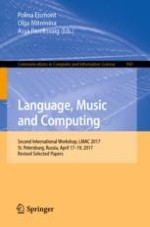2019 | OriginalPaper | Chapter
When Language Survived, Music Resurrected and Computer Died: To the Problem of Covert Ontologies in Language
Author : Anastasia Kolmogorova
Published in: Language, Music and Computing
Publisher: Springer International Publishing
Activate our intelligent search to find suitable subject content or patents.
Select sections of text to find matching patents with Artificial Intelligence. powered by
Select sections of text to find additional relevant content using AI-assisted search. powered by
